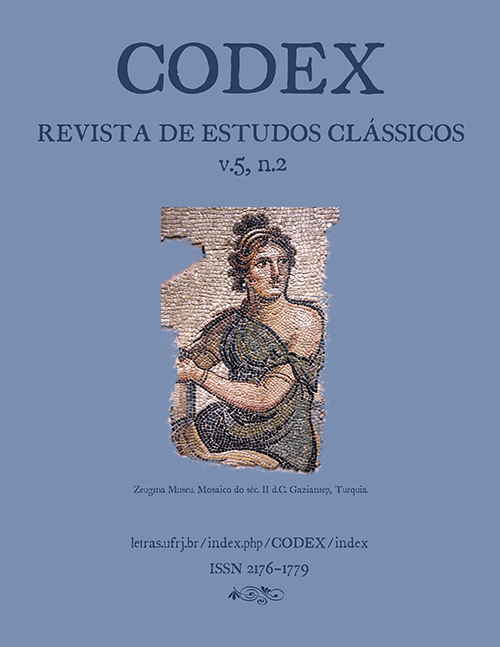Gregory of Nyssa and Epiditic Rhetoric
DOI:
https://doi.org/10.25187/codex.v5i2.11558Keywords:
Gregory of Nyssa, Rhetoric, EducationAbstract
Epideictic rhetoric was an important literary movement in Roman imperial times and it was an essential part of the superior education in Late Antiquity. Despite being educated in this system, Saint Gregory of Nyssa reveals himself quite detached from this literary practice in his written works, culminating in the first chapter of his treaty On Virginity with the complete denial of any use to rhetorical praise (encomium). This paper examines the opinions Saint Gregory express in his Works and how they point to the development of a Christian rhetoric.References
Fontes primárias:
GREGÓRIO de Nissa Gregorii Nysseni Opera (Edd. Jaeger, W. et alii) 11 vols. Leiden: Brill, 1960-1972.
GREGÓRIO de Nazianzo Opera quae extant omnia. Patrologia Graeca vol 37 (ed. J-P. Migne). Paris: J-P. Migne, 1862.
LIBÂNIO Opera (Ed. Foester, R.) vol. III. Leipzig: Teubner, 1906.
MENANDRO Retor Menander Rhetor: A commentary (edd. Russell, D.A., Wilson, N.G.). Oxford: Clarendon Press, 1981.
Fontes secundárias:
ANDERSON, G. The Second Sophistic. A Cultural Phenomenon in the Roman Empire. Londres e Nova York: Routledge, 1993.
BRANDÃO, J.L. Em Nome da (In)Diferença: O mito grego e os apologistas cristãos do segundo século. Campinas: Editora Unicamp, 2014.
BROWN, P. Through the Eye of a Needle: Wealth, the Fall of Rome, and the Making of Christianity in the West, 350-550 AD. Princeton: Princeton University Press, 2014.
BURCKHARDT, J. Del paganismo al cristianismo: La época de Constantino el Grande. Cidade do México: Fondo de cultura Económica, 1996.
ESPER, M. “Enkomiastik und Christianismos in Gregors epideiktischer Rede auf den Heiligen Theodor” in SPIRA, A. The Biographical Works of Gregory of Nyssa.Proceedings of the Fifth International Colloquium on Gregory of Nyssa (Mainz, 6-10 September 1982). Philadelphia Philadelphia Patristic Foundation, 1984.
FOX, R. L. Pagans and Christians. Nova York: Viking, 1986.
KELLY, J.N.D. Golden Mouth: The Story of John Chrysostom -- Ascetic, Preacher, Bishop. Ithaca, Cornell University Press, 1995.
LAMPE, G.W.H. A Patristic Greek Lexicon. Oxford: Clarendon Press, 1961.
MARROU, H-I. História da educação na Antiguidade. São Paulo: EPU, 1973.
MEREDITH, A. The Cappadocians. Nova York, SVS Press, 2000.
MÉRIDIER, L. L'Influence de la Seconde Sophistique sur l'Oeuvre de Grégoire de Nysse. Paris: Hachette, 1906.
OWEN, E. C. E., ‘St Gregory of Nysa: Grammar, Vocabulary and Style', Journal of Theological Studies 26 pp. 64-72, 1925.
PERNOT, L. La rhétorique de l'éloge dans le monde gréco-romain. Paris, Études Augustiniennes, 1993.
PERNOT, L. Epideictic Rhetoric: Questioning the Stakes of Ancient Praise. Austin: University of Texas Press, 2015.
Downloads
Additional Files
Published
How to Cite
Issue
Section
License
This work is licensed under a Creative Commons Attribution-NonCommercial 4.0 International License.










